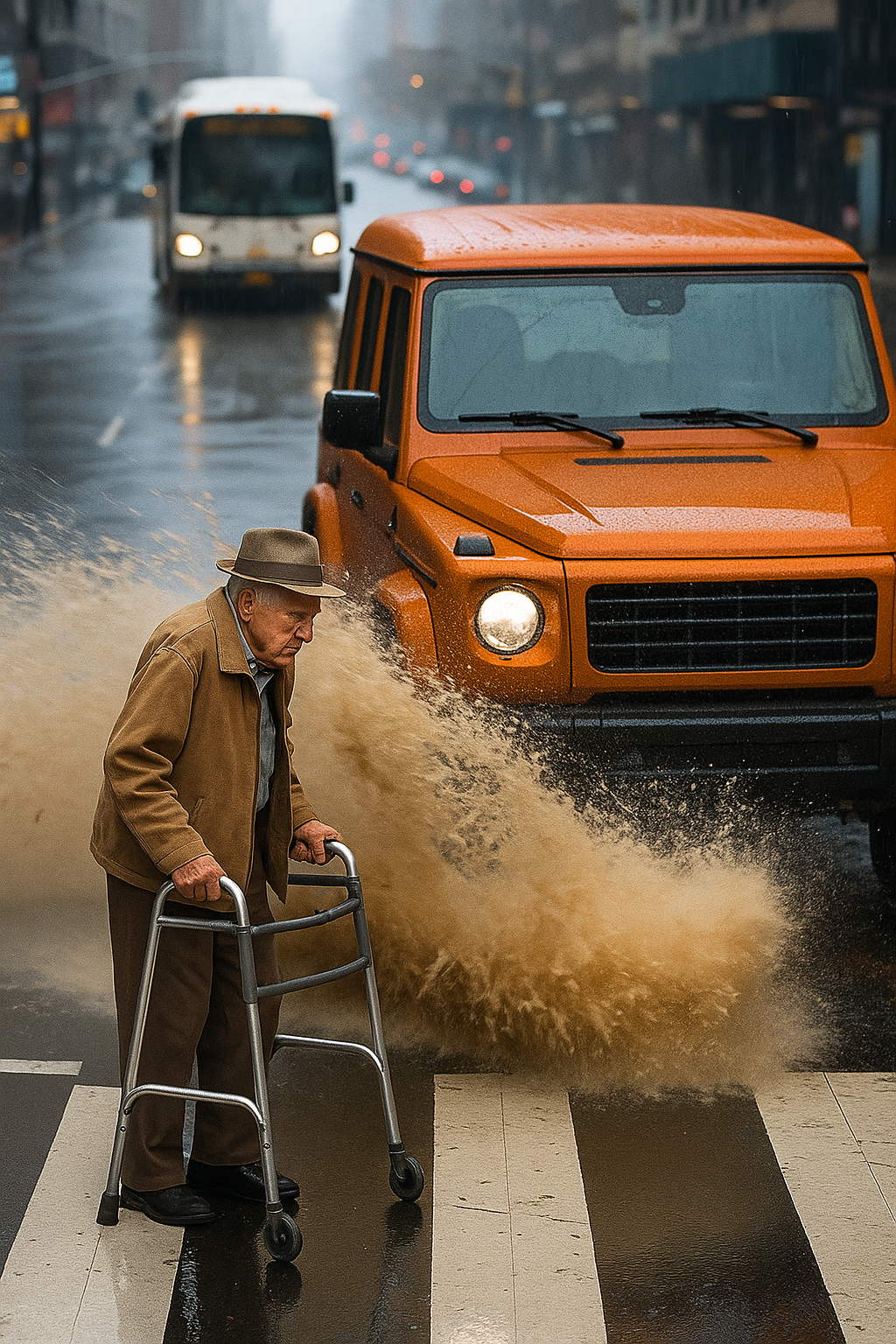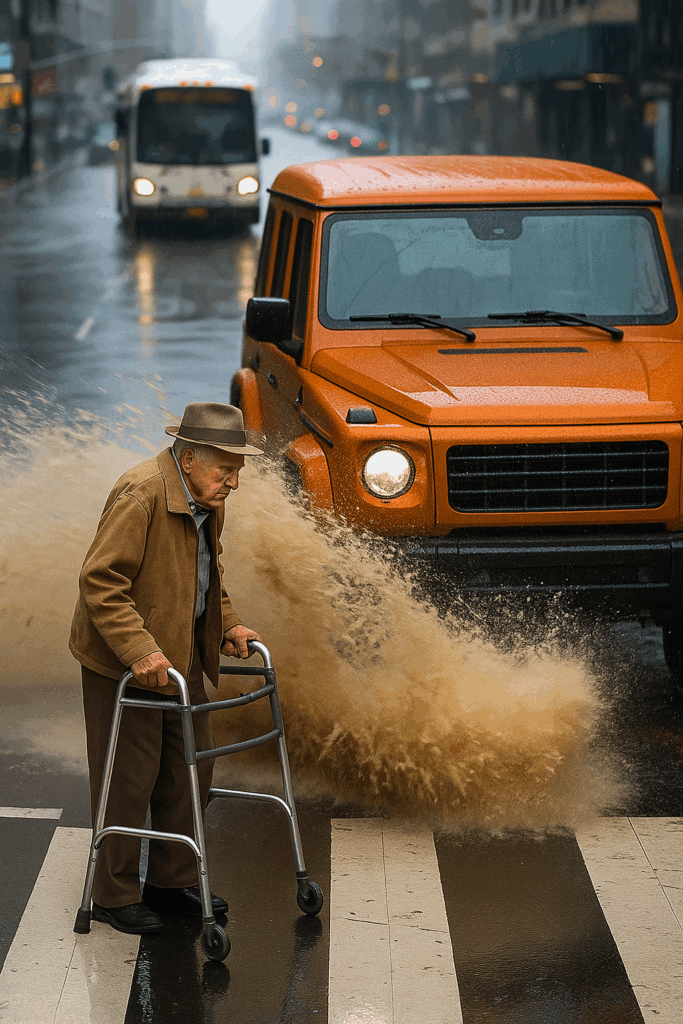The rain fell in sheets that afternoon — the kind that blurs the edges of the world and makes even neon signs look like ghosts. It was 4:37 p.m. in downtown Chicago, and the city was crawling through rush hour under a gray sky. Horns, puddles, and impatience filled the streets. At the intersection of Michigan Avenue and East Ontario, a man named Daniel Ross stood waiting for the light to change.
He was seventy-eight years old. His fedora sagged under the rain. His hands — thin but steady — gripped the silver handles of his walker. He had crossed that street for years on his way to the diner on the corner, “Maggie’s Place,” where they knew his order by heart: black coffee, rye toast, and a small bowl of soup.
That day, though, something was different.
A young woman with a camera stood on the sidewalk across from him, fiddling with her lens beneath an umbrella. Her name was Olivia Chen, a street photographer who’d come to Chicago to chase human stories — real, unposed, raw moments.
She saw Daniel through the rain and instinctively raised her camera.
The light turned green. Daniel stepped forward. And that’s when it happened.
From the corner of her eye, Olivia saw it first — a black Mercedes-Benz G-Wagen barreling toward the crosswalk, its headlights cutting through the gray. It wasn’t slowing down.
“Sir!” she shouted, but her voice drowned beneath the hiss of tires and rain.
The SUV plowed through a deep puddle. Water exploded outward, a muddy tidal wave that slammed against Daniel and his walker.

The camera shutter clicked — once, twice, three times — pure reflex. For a fraction of a second, time froze in the lens: The spray of water. The shock in the old man’s eyes. The blurred outline of a luxury car disappearing into the rain.
Then came silence.
Daniel stood there, dripping, his hat knocked sideways, his hands trembling. He didn’t fall. He didn’t shout. He just stared ahead, expression blank. Then, slowly, he straightened his fedora, pushed his walker forward, and kept walking.
The Photo That Changed Everything
Olivia didn’t know what to do. She ran over to him, apologizing, offering her scarf. He smiled faintly. “Not your fault, sweetheart. World’s just in a hurry.”
He disappeared into the diner as if nothing had happened. That night, Olivia posted one of the photos on her small photography page with the caption:
“Some people drive through life without seeing who they splash.”
By morning, it had over 300,000 shares. The image went viral — “The Splash,” people called it. Newspapers picked it up. Comment sections filled with outrage, sadness, and theories. Who was the man? Who was the driver?
Someone recognized the car. Then, someone else connected the plates. It belonged to Ethan Collins, a 35-year-old venture capitalist — the son of a prominent state senator.
Within a week, reporters were at Ethan’s office, demanding answers. He insisted it was an accident. “I didn’t see the puddle,” he said. “I didn’t know it hit anyone.” The internet didn’t believe him.
But what no one knew — not yet — was that Daniel Ross had a history that tied him to Ethan in a way no one could have imagined. Because Daniel hadn’t always been a fragile man with a walker. Decades ago, he had been Detective Ross, the cop who’d investigated Senator Collins’ campaign fraud case — the one that mysteriously disappeared before trial.
Daniel had lost his career over that file. He’d never proven what happened, but he’d always suspected the senator had paid to have it buried. Now, fate — or irony — had brought his son crashing through his path.
When Olivia found Daniel again to ask if he wanted to give a statement, he simply said, “Let the picture speak. People will see what they want.” But Olivia saw more. There was a reason he hadn’t reacted in anger. She saw it in his eyes — the quiet recognition of a past debt being repaid by chance.
Weeks passed. The story faded from the headlines. The world moved on.
But one rainy afternoon, Olivia returned to the same intersection. She wanted to photograph Daniel again — to give his story a proper ending.
Except he wasn’t there. Instead, the owner of the diner told her, “He passed away last week. Heart gave out in his sleep. Peaceful.”
Olivia felt the loss hit like thunder. But there was one more surprise.
Daniel had left a note addressed to “the photographer with kind eyes.”
Inside was an old photograph — him as a young detective, standing beside a file marked Collins Case, 1987 — and a small handwritten line:
“Funny how truth always finds a puddle to reflect in.”
Olivia framed both photos — hers and his — side by side in her next exhibition, calling it:
“The Splash: Two Collisions, Thirty Years Apart.”
It went on to win an award for Human Storytelling of the Year. Yet every time someone asked Olivia what the story behind the old man was, she only said one thing:
“He forgave the world before the world knew what it owed him.”
And sometimes, when it rained, people claimed to see a figure with a fedora at that same crosswalk —waiting for the light, smiling faintly, as if time had stopped right where forgiveness began.


